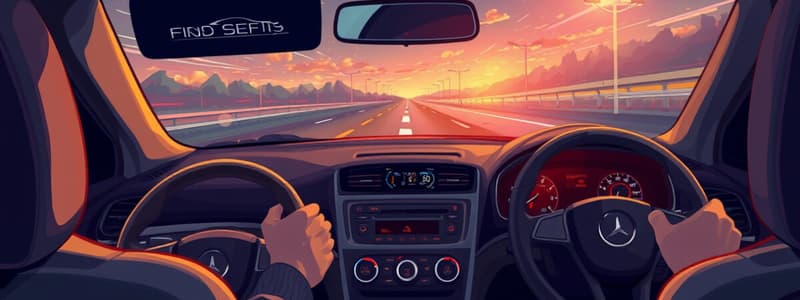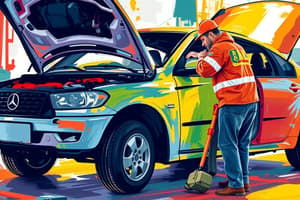Podcast
Questions and Answers
What is the primary reason for the majority of vehicle crashes?
What is the primary reason for the majority of vehicle crashes?
- Mechanical failure
- Adverse weather conditions
- Road infrastructure issues
- Human error (correct)
How often should you check your tires, lights, and controls before driving?
How often should you check your tires, lights, and controls before driving?
- Only when you notice a problem
- Every month
- Once a week
- Every time you drive (correct)
Which safety technology provides warnings for vehicles entering your blind spot?
Which safety technology provides warnings for vehicles entering your blind spot?
- Blind spot monitoring system (correct)
- Lane departure warning system
- Collision warning system
- Adaptive cruise control
What must you do when securing your vehicle with a push button start ignition?
What must you do when securing your vehicle with a push button start ignition?
Why is checking tire tread depth critical for vehicle safety?
Why is checking tire tread depth critical for vehicle safety?
Where can one find detailed information about their vehicle’s safety devices and instrument panel?
Where can one find detailed information about their vehicle’s safety devices and instrument panel?
What should be done if the gas gauge indicates a quarter full?
What should be done if the gas gauge indicates a quarter full?
What is the significance of the parking brake light being on?
What is the significance of the parking brake light being on?
How should one position their seat to ensure proper use of the safety belt?
How should one position their seat to ensure proper use of the safety belt?
What is meant by the term 'momentum' in relation to a vehicle?
What is meant by the term 'momentum' in relation to a vehicle?
What effect does braking have on the weight distribution of a vehicle?
What effect does braking have on the weight distribution of a vehicle?
What should a driver do when approaching a sharp curve?
What should a driver do when approaching a sharp curve?
Which driving maneuver can help a driver spot a nearby bicyclist before exiting the vehicle?
Which driving maneuver can help a driver spot a nearby bicyclist before exiting the vehicle?
What is the defined blood alcohol content (BAC) level that prohibits anyone under 21 from operating a motor vehicle?
What is the defined blood alcohol content (BAC) level that prohibits anyone under 21 from operating a motor vehicle?
At what age should children not be left unattended in a vehicle?
At what age should children not be left unattended in a vehicle?
Which area of vision should be used for making targeting decisions while driving?
Which area of vision should be used for making targeting decisions while driving?
What is the primary benefit of keeping headlights on at all times while driving?
What is the primary benefit of keeping headlights on at all times while driving?
What is the first action you should take upon observing a potential conflict or hazard ahead while driving?
What is the first action you should take upon observing a potential conflict or hazard ahead while driving?
What does the acronym PDA stand for in driver’s education?
What does the acronym PDA stand for in driver’s education?
What is the term used for the space we travel from when we perceive a hazard to when our brain identifies it?
What is the term used for the space we travel from when we perceive a hazard to when our brain identifies it?
What can restrict your line of sight while driving?
What can restrict your line of sight while driving?
What should a driver do when they see an emergency vehicle to their side?
What should a driver do when they see an emergency vehicle to their side?
When approaching a railroad crossing while in slow traffic, what should you do?
When approaching a railroad crossing while in slow traffic, what should you do?
What is the appropriate action at an unprotected railroad crossing?
What is the appropriate action at an unprotected railroad crossing?
When stopped at a school bus with red flashing lights, how long should you remain stopped?
When stopped at a school bus with red flashing lights, how long should you remain stopped?
What should you do when passing a large truck on the expressway?
What should you do when passing a large truck on the expressway?
How much space should you give when passing a bicycle?
How much space should you give when passing a bicycle?
What is the proper way to stop in relation to a stop line or crosswalk?
What is the proper way to stop in relation to a stop line or crosswalk?
What should you do if you see a blind pedestrian using a white cane?
What should you do if you see a blind pedestrian using a white cane?
When driving with parked vehicles to your right, where should you position your vehicle?
When driving with parked vehicles to your right, where should you position your vehicle?
What is the correct method to measure your following distance behind another vehicle?
What is the correct method to measure your following distance behind another vehicle?
If you are being tailgated, where should you keep more space?
If you are being tailgated, where should you keep more space?
What should be your primary action if you are driving on an open roadway?
What should be your primary action if you are driving on an open roadway?
When performing a parallel parking maneuver, how far should you start positioning your vehicle from the car you want to park behind?
When performing a parallel parking maneuver, how far should you start positioning your vehicle from the car you want to park behind?
What should you do after completing a turn in a vehicle?
What should you do after completing a turn in a vehicle?
What type of acceleration should be used while passing another vehicle?
What type of acceleration should be used while passing another vehicle?
What should you see in your inside rearview mirror to safely return to your lane after passing?
What should you see in your inside rearview mirror to safely return to your lane after passing?
Study Notes
Vehicle Safety and Features
- Owners manual provides detailed information about the instrument panel and safety devices.
- The horn serves as a communication device to warn others of potential danger.
- Proper seating position is crucial for the safety belt to function effectively.
- An airbag does not protect occupants effectively without safety belt usage.
- The heel of the foot should touch the floor for proper seat adjustment.
Gear Shift Positions
- Gear shift letters signify:
- P = Park
- R = Reverse
- N = Neutral
- D = Drive
- 2 = Second gear
- 1 = First gear
Parking and Safety Indicators
- A lit parking brake light indicates that the parking brake is engaged.
- Turning off lights and accessories after parking prevents battery drain.
- If the gas gauge reads a quarter tank, prompt refueling is necessary.
- Head restraints are designed to protect against rear-end collisions.
Driving Techniques and Momentum
- Properly adjusted mirrors reduce blind spots and minimize head and shoulder movements.
- Most collisions at curves happen due to excessive speed.
- Increased vehicle momentum makes braking more difficult.
- Safety belts are essential for keeping drivers secure in a crash due to inertia.
- Without steering through a curve, the vehicle tends to drive straight.
Driving Metrics
- Deceleration consists of coasting, controlled squeeze, and thrust hold.
- Agility in switching between brake and accelerator pedals relies on foot movements.
- The technique known as “The Dutch Reach” can help identify nearby bicyclists when exiting a vehicle.
Legal and Safety Protocols
- Under 21s are prohibited from operating a vehicle with any detectable alcohol content (BAC ≥ 0.02).
- Insurance proves a vehicle owner's financial responsibility in Michigan.
- Children under six should not be left unattended in vehicles.
- Position hands on the dashboard or steering wheel if pulled over by law enforcement.
Vision and Perception in Driving
- Ground viewing enhances a driver’s awareness of surrounding activity.
- Peripheral vision helps gauge speed.
- Central vision is needed for targeting while driving.
- Using headlights at all times is safer for drivers and others.
- The area that can be seen while driving is called the field of view.
Managing Time and Space
- Slow down when approaching hazards.
- Position vehicles towards the left when parked cars are on the right.
- Following distance should be measured in seconds; increase it when speeding.
- Keep a safe distance from bicycles—at least 3 feet when passing.
Lane Changes and Parking Techniques
- Look over the right shoulder when reversing from a diagonal parking space.
- Check mirrors and blind spots before changing lanes.
- Park no more than 12 inches from the curb.
- Identify appropriate gaps before executing lane changes on expressways.
Interactions with Other Road Users
- Vehicles must slow down at least 10 mph below the limit when following emergency vehicles.
- Stop at least 15 feet from railroad tracks.
- Yield to pedestrians, especially those using guide dogs or white canes.
- Motorcycles require increased following distance due to their size and visibility challenges.
Vehicle Maintenance and Safety Technologies
- Regularly check tires, lights, and controls before driving.
- Tire tread depth is crucial for preventing skids and ensuring traction during rain.
- Use the Hazard lights to signal breakdowns to other drivers.
- Blind Spot Monitoring Systems alert drivers to potential hazards in adjacent lanes.
- Electronic Stability Control (ESC) helps stabilize vehicles during skids and loss of traction.
Studying That Suits You
Use AI to generate personalized quizzes and flashcards to suit your learning preferences.
Description
Test your knowledge about vehicle safety devices and the instrument panel with this quiz. You'll learn important aspects like the proper use of safety belts, airbags, and seating adjustments. Perfect for new drivers and those looking to refresh their understanding of vehicle safety.




